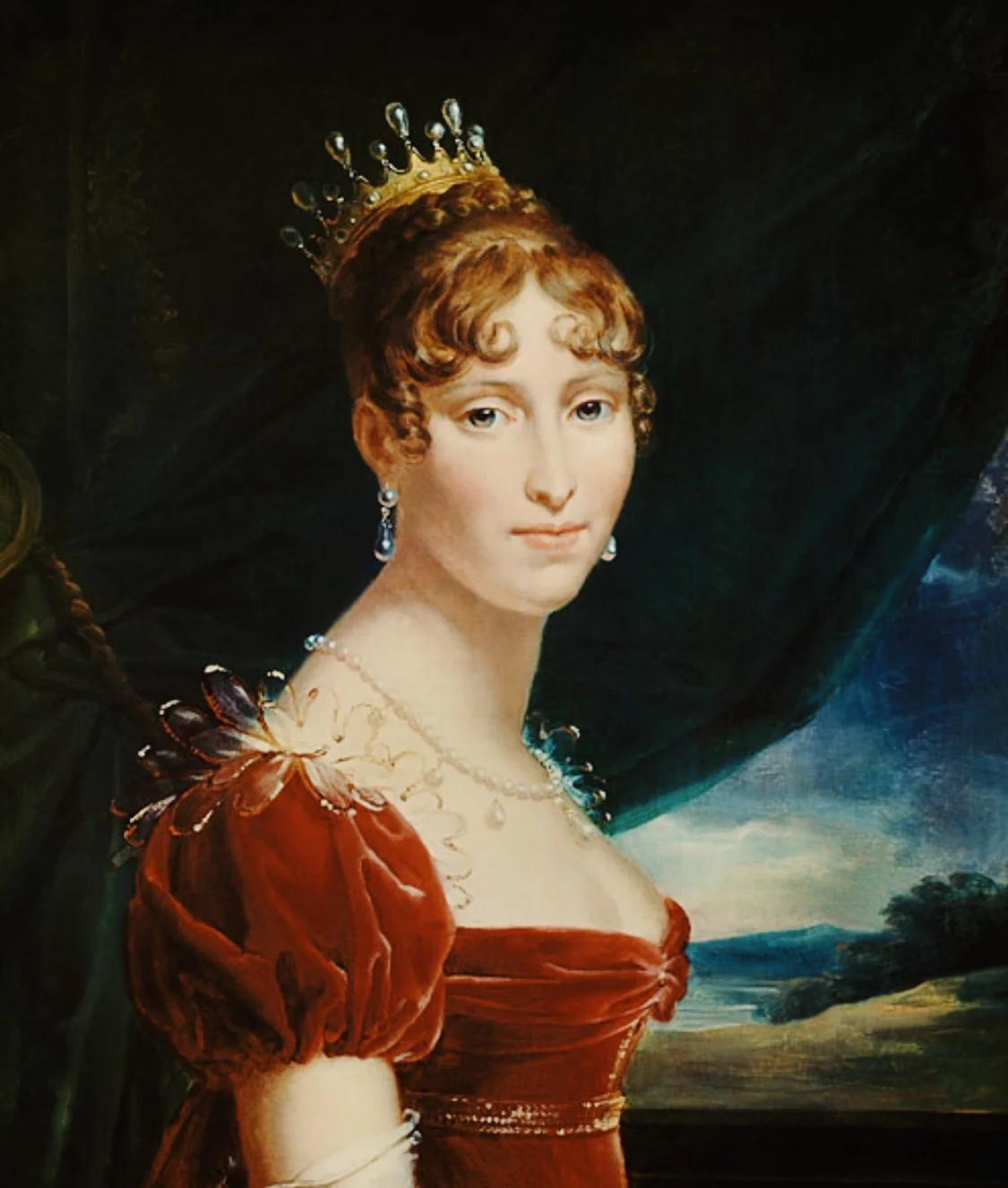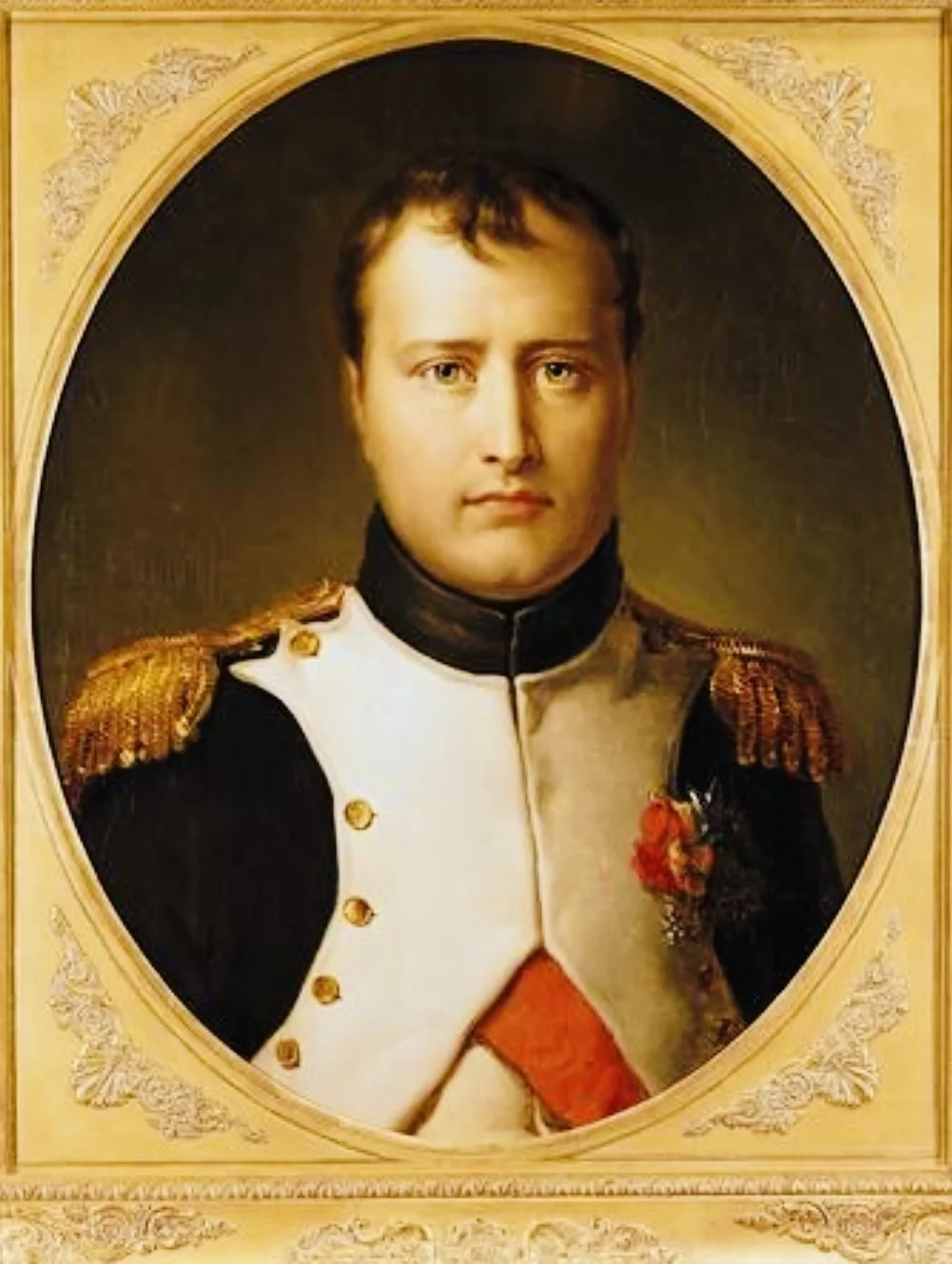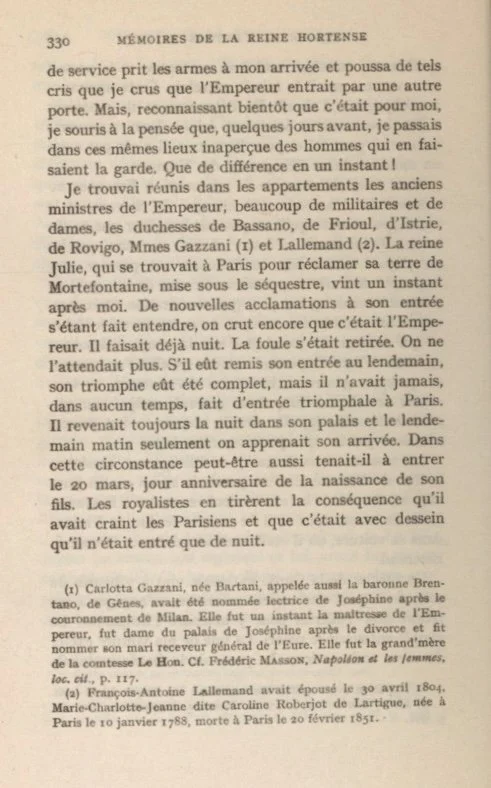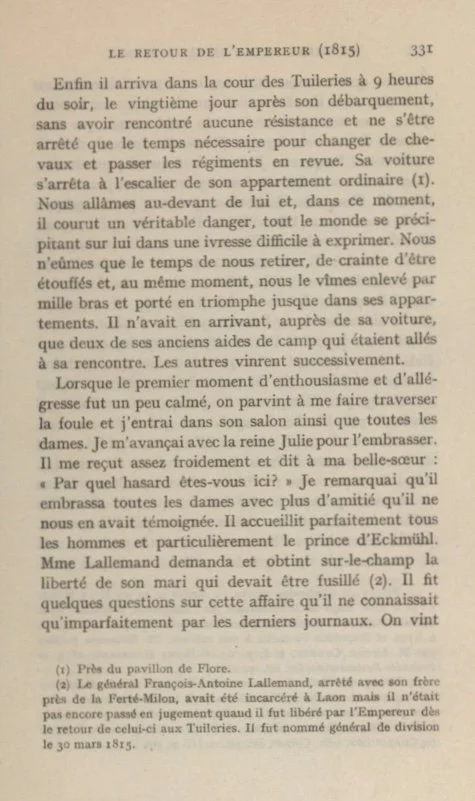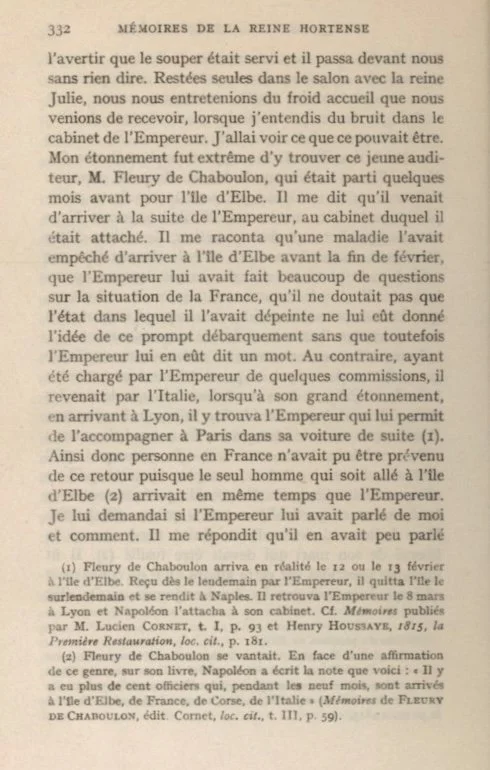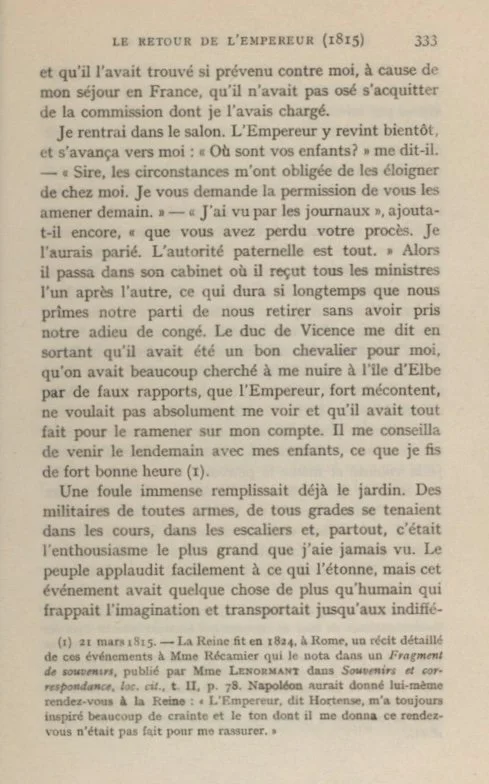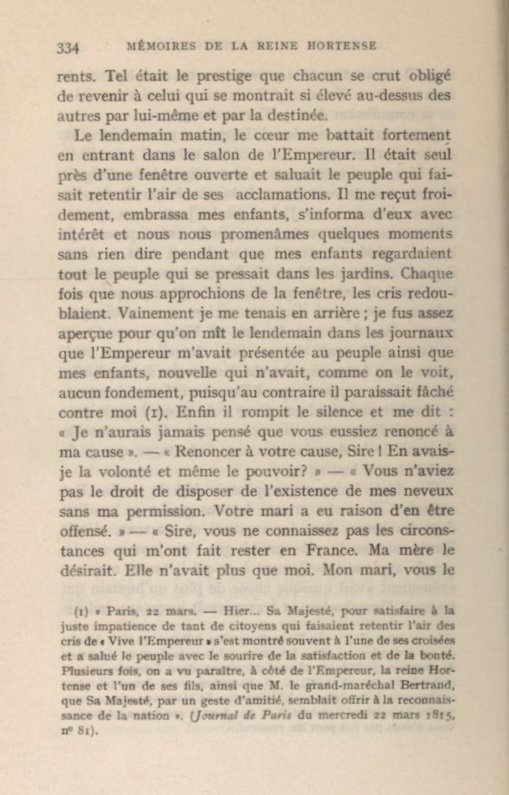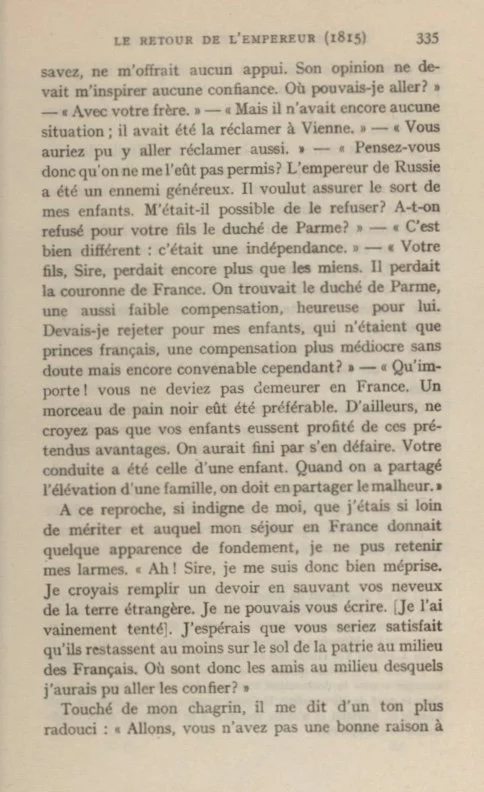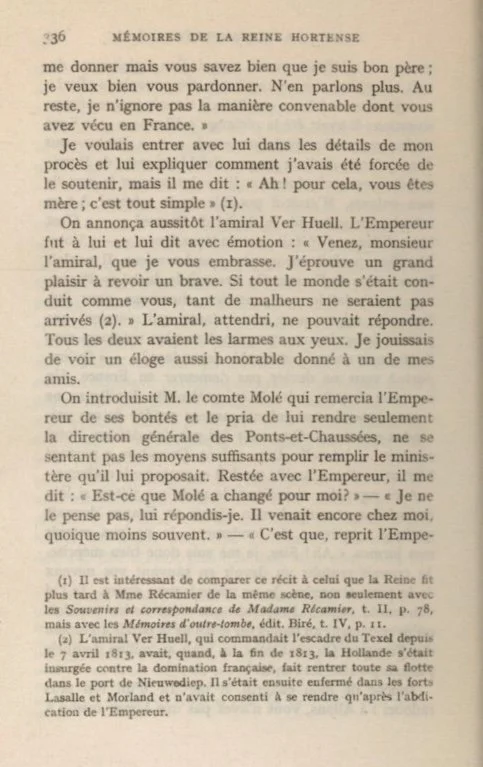Let’s have another look at Hortense’s Memoirs. If you want to read the book it is available for free at the side bar in English and French. Use the widget on the sidebar to translate the text below into pretty much any language.
There were constant hands trying to drive wedges between Hortense and Napoleon.
Napoleon returned from Elba extremely hurt by what he had been hearing about Hortense. If they could actually speak to each other, it usually wasn’t too difficult for them to restore mutual understanding.
Hortense’s memoirs continues:
The royalists declared it was fear of the attitude of the Parisians which delayed him, and that he did not arrive till after dark intentionally. Finally, at nine o'clock he drove up into the court of the Tuileries, just twenty days after he had landed on, French soil.
He had not encountered the least resistance anywhere and had only stopped long enough to change horses and review the different troops. His carriage stopped at the entrance to his ordinary apartments.
We went to meet him, and for a few moments he was in actual danger so great was the eagerness with which people pressed forward, seized by an intoxication which it is difficult to explain.
We could scarcely manage to withdraw from the crowd in order to avoid being suffocated ourselves. As we did so we saw him caught up by a thousand arms and carried in triumphantly to his own apartments. When he arrived, there were only two of his former aides-de-camp beside his carriage.
The others reached Paris later. When the first movement of joy and enthusiasm had passed, my friends managed to make a path for me through the crowd, and I was able to enter his drawing-room with the other ladies. I stepped forward to embrace him accompanied by Queen Julie. He received me rather coldly and asked my sister-in-law, "How does it happen you are here?"
I noticed he embraced all the other ladies more warmly than he did us. He greeted all the men in a most cordial manner, especially Prince of Eckmühl [General Davout, with whom Napoleon had won the battle of Eckmühl in 1809].
Madame Lallemand asked for and obtained immediately the release of her husband, who had been sentenced to death on account of having headed a mutiny.
The Emperor asked her various questions about this incident which he had heard about only vaguely in the recent newspapers. It was announced that supper was ready and he went in, passing us without a word.
Queen Julie and I were alone in the drawing-room speaking of the cold reception which we had received when I heard a noise in the Emperor's study. I went to see what it was. To my extreme surprise I discovered there the young accountant Fleury de Chaboulon who had left a few months before to go to Elba.
He told me he had arrived at the Tuileries just after the Emperor to whose cabinet he was attached. It seemed that an illness had prevented his reaching Elba before the end of February.
On his arrival the Emperor had asked a great many questions regarding conditions in France and he was quite sure it was his account that had made the Emperor decide to land so quickly although the Emperor had never said a word to this effect.
On the contrary, having returned by way of Italy to do certain things for the Emperor, he was amazed on arriving at Lyons to find his master there.
The latter had allowed him to come to Paris in one of his carriages. Thus no one in France could have received word of this return for the only man who went to Elba arrived in France after the Emperor did.
I asked Monsieur Fleury de Chaboulon if the Emperor had spoken about me and what he had said. His reply was that he had scarcely mentioned me as the Emperor had appeared so indignant at my having remained in France that he had not dared deliver my message to him.
I returned to the drawing-room. The Emperor came in a few minutes later and stepped up to me. "Where are your children?" he said.
“Sire, existing conditions obliged me to send them away from home. I ask your permission to bring them to you tomorrow."
“I see by the papers," he went on, "that you lost your case. I was sure you would. Everything depends on paternal authority."
Then he went into his study where he received all his ministers one after another. This took so long that we decided to withdraw, although we had not yet made our farewells.
The Duc de Vicence, as we went out, told me he had taken my part, that people had tried to do me much harm at Elba by false reports about me and that the Emperor, greatly annoyed, did not wish to receive me at all.
The Duke told me that he himself had done everything he could to modify this attitude. He advised me to come the next day with my children. I did so and arrived very early. An enormous crowd already filled the garden.
Officers of all branches of the service and every rank crowded about the courtyards and the stairways. Never had I seen such enthusiasm. People are always willing to applaud anything that arouses their astonishment, but this event had something superhuman about it which stirred even the least interested observer.
Such was the prestige which everyone felt obliged to accord the man who had shown himself so far above ordinary beings by his personal character and by his career.
My heart beat violently when I entered the Emperor's drawing-room. He was alone near the open window, returning the acclamations of the people which filled the air.
He received me coldly, embraced my children, inquired with interest about their health, after which we walked about for a few minutes without saying anything while my children watched the crowds that thronged the gardens. Every time we approached the window the cheers increased. In vain I sought to remain in the background I was so conspicuous that the next day the newspapers stated that the Emperor had called the crowd's attention to me and my children, an account which was altogether inaccurate as, on the contrary, he still seemed angry with me.
Finally, he broke the silence and said, "I would never have thought you would forsake my cause."
“Forsake your cause, Sire? Would I, or even could I have done such a thing?"
“You had no right to dispose of the future of my nephews without my permission. Your husband was right to be distressed by such behavior."
“Sire, you do not know the reasons which made me remain in France. My mother wished me to do so. I was all she had left. My husband as you know offered me no support. His advice could not inspire me with any confidence. Where was I to go?"
“With your brother."
“But he had no situation of his own as yet. He had gone to ask for one at Vienna."
“You could have gone and demanded one also."
“Do you think I should have been allowed to do so? The Emperor of Russia proved a generous foe. He wished to assure my children's future. Could I possibly have refused him? Did anyone decline the Duchy of Parma which was offered your son?"
“That was quite different. That insured his independence."
“Your son, Sire, had lost more than mine. He had lost the throne of France. People considered he was fortunate in securing even so small a compensation as the Duchy of Parma.
Should I have refused for my sons, who were only princes, a compensation, which doubtless was still less important in itself, but nevertheless was more so in proportion to their position?"
“What does that matter? You had no business to stay in France. A piece of bread by the roadside would have been preferable. Moreover, don't imagine that your children would have been benefited by these so-called gifts. They would have been got rid of. You behaved like a child yourself. When one has shared a family's rise in rank one must share its misfortunes."
On receiving this reproof, which I so little deserved but which my having remained in France seemed partly to justify, I could not restrain my tears. "Ah, Sire, how greatly I have been mistaken! I thought I was doing my duty in keeping your nephews from going into a foreign country. I could not write you. I vainly attempted to do so. I hoped you would be pleased that at any rate they remained on French soil in the midst of their countrymen. Where were there any friends to whose care I could have confided them?"
Touched by my grief, the Emperor said to me in a milder tone: "Now then, now then, you have not a single good excuse to make, but you know I am a good father and shall forgive you willingly. Let us not speak of it any more. Besides, I know how well you behaved while living in France."
The original French is available below:

